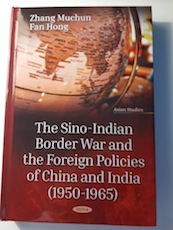Zhang Muchun & Fan Hong ~ The Sino-Indian Border War And The Foreign Policies Of China And India (1950-1965)
 There has been growing interest in the historical analysis of the Sino-Indian relations and the Sino-Indian border issue, yet little research has focused on the impact of two government’s foreign policies concerning the Sino-Indian border issue and border war. This book examines the Sino-Indian relations, particularly the Sino-Indian border issue and border war, Tibetan issues, and China and India’s foreign policies from the 1950s to 1960s. This book will discuss the origin and development of the Sino-Indian border issue and connections between national diplomatic policies and the border disputes in China and India.
There has been growing interest in the historical analysis of the Sino-Indian relations and the Sino-Indian border issue, yet little research has focused on the impact of two government’s foreign policies concerning the Sino-Indian border issue and border war. This book examines the Sino-Indian relations, particularly the Sino-Indian border issue and border war, Tibetan issues, and China and India’s foreign policies from the 1950s to 1960s. This book will discuss the origin and development of the Sino-Indian border issue and connections between national diplomatic policies and the border disputes in China and India.
More specifically, this book aims to illustrate the origins of the Sino-Indian border dispute, the role Tibet played in the Sino-Indian border issue, the impacts of their foreign policies on the Sino-Indian border issue from the 1950s to the 1960s, the measures both states took to ease boundary tensions and conflicts, the reasons for the outbreak of the 1962 Border War, and the changes to foreign policies the two governments made before and after the 1962 Border War. This book involves the collection and analysis of historical archival materials and official documents from both China and India.
The book is mainly aimed at researchers, undergraduates and postgraduate students in the subject areas of the history of international relations and Chinese studies. It could be used in a wide range of courses since it offers insights into the aspects of historical and international relations found within Chinese society. It will be of interest to academic libraries, research institutes, universities, and students either as a textbook or as reading material. Due to the appeal and relevance of the subject, this book would also be of interest to people who want to know more about the history of Sino-Indian border disputes as well as China and India’s foreign policies from 1950 to the 1960s through such a particular and appropriate topic.
Asian Studies (Series Editors: Fan Hong, Auke van der Berg and Peter Herrmann – Bangor University, UK, Rozenberg Quarterly, Netherlands and EURISPES – Istituto di Studi Politici, Economici e Sociali, Italy) – Nova Science Publishers, New York, 2018 – ISBN 978-1-53613-770-5
Got to: https://www.novapublishers.com/
Oscar Perry Abello ~ Welcome To San Francisco. Would You Like To Make A Deposit?
A groundswell of interest in public banking has advocates pondering how city-owned banks could transform the way municipalities collect and spend their money.
It’s no surprise that Malia Cohen worries about what local public dollars are doing. As a member of the San Francisco Board of Supervisors, the municipal legislative body, it’s her job to know how, where and why the city’s money is coming in and going out. But recently, Cohen has joined a growing number of public officials around the country who are wondering what happens in between — what happens when the money in the city coffers goes to sleep at night.
In fiscal year 2017, the city of San Francisco took in an average of $508 million a month in revenues and put out $467 million a month in expenses. But in between, the banks that handle all that cash sometimes used public dollars in ways that, in the opinions of Cohen and others, contradict the reasons why that money is coming and going in the first place.
“The existing banking and financial structures we’re operating in don’t always mirror our city’s values,” Cohen says. “For example, we had many people opposing the Dakota Access Pipeline. Many of the banks we bank with support the funding of this pipeline.”
Read more: https://nextcity.org/welcome-to-san-francisco-would-you-like-to-make-a-deposit
- Page 2 of 2
- previous page
- 1
- 2


